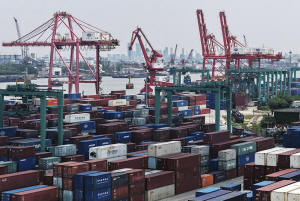US-China trade talks: Can China reduce its export dependence?
[July 26, 2025] By
KEN MORITSUGU
BEIJING (AP) — China’s high dependence on exports will likely be a key
focus of a new round of U.S.-China trade talks this coming week in
Stockholm, but a trade deal would not necessarily help Beijing to
rebalance its economy.
U.S. Treasury Secretary Scott Bessent has said he hopes the negotiations
can take up this issue, along with China's purchases of oil from Russia
and Iran, which undercut American sanctions on those two countries.
Hopes rose for a breakthrough in talks after U.S. President Donald Trump
announced deals with Japan, Indonesia and the Philippines this week.
The U.S. wants China to do two things: Reduce what both the U.S. and the
European Union see as excess production capacity in many industries,
including steel and electric vehicles. And secondly, to take steps to
increase spending by Chinese consumers so the economy relies more on
domestic demand and less on exports.
“We could also discuss the elephant in the room, which is this great
rebalancing that the Chinese need to do,” Bessent told financial news
network CNBC. He said China's share of global manufacturing exports at
nearly 30%, “can’t get any bigger, and it should probably shrink.”
China is tackling the same issues — for domestic reasons
The issues are not new, and China has been working to address them for
years, more for domestic reasons than to reduce its trade surpluses with
the U.S. and other countries.

Bessent's predecessor as treasury secretary, Janet Yellen, made
industrial policy a focus of a trip to China last year. She blamed
government subsidies for flooding the global market with “artificially
cheap Chinese products.” The European Union, whose top leaders met their
Chinese counterparts in Beijing on Thursday, has cited subsidies to
justify EU tariffs on electric vehicles made in China.
In the 1980s, the U.S. pressured Japan to boost consumer spending when
American manufacturing was overwhelmed by exports from the likes of
Toyota and Sony. Economists have long argued that China likewise needs
to transform into a more consumer-driven economy. Consumer spending
accounts for less than 40% of China’s economy, versus close to 70% in
the United States and about 54% in Japan.
Chinese leaders have spoken about both factory overcapacity and weak
consumer spending as long-term problems and have sought over the past 20
years to find ways to rebalance the economy away from export
manufacturing and massive investments in dams, roads, railways and other
infrastructure.
Fierce price wars have prompted critical reports in official media
saying that companies are “racing to the bottom,” skimping on quality
and even safety to reduce costs.
With strong government support, they've also expanded overseas, where
they can charge higher prices but still undercut local competitors,
creating a political backlash.
Economists say China needs a consumer-driven economy
All that competition and price cutting has left China battling
deflation, or falling prices. When companies receive less for their
products, they tend to invest less. That can lead to job cuts and lower
wages, sapping business activity and spending power — contrary to the
long-term goal of increasing the share of consumer spending in driving
overall growth.
To counter that, the government is spending billions on rebates and
subsidies for people who trade in their cars or appliances for new ones.
But acknowledging a problem and solving it are two different things.
Economists say more fundamental changes are needed to boost consumption
and rein in overcapacity. Such changes can only come incrementally over
time.
[to top of second column] |

Machines loading container at a container terminal, in Shanghai,
China on Wednesday, May 14, 2025. (Chinatopix Via AP,File)
 Private Chinese companies and
foreign-invested companies create the most jobs, but they've
suffered from swings in policy and pressures from the trade war,
especially since the pandemic.
Demographic changes are another challenge as China's population
shrinks and ages.
Many experts advocate expanding China's social safety net, health
insurance, pensions and other support systems, so that people would
feel freer to spend rather than save for a medical emergency or
retirement.
Yan Se, an economist at Peking University's Guanghua School of
Management, warned at a recent forum that deflation will become a
long-term issue if China doesn't step up its welfare benefits.
“Chinese people deserve a better life," he said.
Facing external threats, China wants to be more self-reliant
One possibility, put forward at the same forum by Liu Qiao, the dean
of the business school, would be to change incentives for local
government officials, rewarding them for raising consumption or
household incomes instead of meeting an economic growth target.
He doesn't see that happening nationwide but said it could be tested
in a province.
“That would send out a message that China needs a different
approach,” he said.
Chinese leader Xi Jinping has made transforming the country into a
technology superpower a top priority. It's a goal that has gained
urgency as the U.S. has tightened restrictions on China's access to
high-end semiconductors and other advanced knowhow.
Output in high-tech manufacturing is growing quickly, adding to
potential overcapacity, just as what happened with the government's
encouragement of “green” technologies such as solar panels and wind
turbines.
Various industries, including EV makers, have pledged to address the
issue, but some local governments are striving to keep money-losing
enterprises afloat, reluctant to lose tax revenues and jobs, or to
fail to meet economic growth targets.

Going forward, the government is calling for more coordination of
economic development polices in fields such as artificial
intelligence so that not every province champions the same industry.
But government moves to counter the impact of higher tariffs tend to
support sectors already in overcapacity, and the share of
consumption in the economy has fallen in recent years.
“A sustained improvement in household consumption will require
greater reform ambition,” the World Bank said in its most recent
update on China's economy."
___
AP Business Writer Elaine Kurtenbach in Bangkok contributed to this
report.
All contents © copyright 2025 Associated Press. All rights reserved
 |